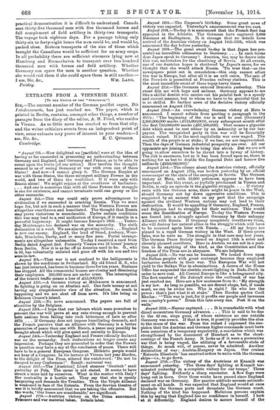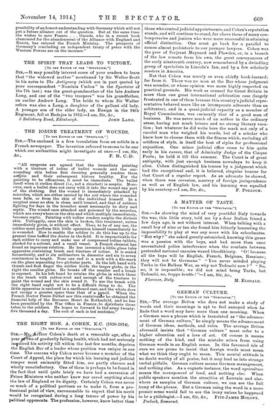EXTRACTS FROM A VIENNESE DIARY.
[To TRY EDITOR OP THE " Spac-rwros:9 SIB,—The current number of the German pacifist organ, Die Fricdenswarte, has just reached me. The paper, which is printed in Berlin, contains, amongst other things, a number of passages from the diary of the editor, A. H. Fried, who resides in Vienna. As so little news has reached us from that city, and the writer criticizes events from an independent point of view, some extracts may prove of interest to your readers.—I am, Sir, &c., E. C. QUIGGIN. Cambridge.
"August 71h.—How delighted we [pacifists] were at the idea of having so far succeeded in promoting an understanding between Germany and England, and Germany and France, as to be able to count upon the fruits [of our action]. How terrible the thought
seemed to us of seeing Germany at war with even one of these States ! And now—I cannot grasp it. The German Empire at war with three States, the three strongest military Powers in the world, and two of them the wealthiest. If it were only with Russia alone! We might rejoice at the overthrow of barbarism. . . . And one is conscious that with all these Powers the struggle is one for existence, and cannot terminate until one group or the other succumbs.
August 8th.—This war could only prove advantageous to civilization if we succeeded in crushing Russia. This we must hope for, but not in such a manner that the Western Powers are altogether overthrown and humiliated. The thought that Russia may prove victorious is unendurable. Under certain conditions this war may lead to a real enifieotion of Europe, if it results in a powerful hegemony. It might become Europe's 1866.... Yester- day Montenegro too declared war on the monarchy. The sixth declaration in a week. We are almost growing callous .. . England is now our enemy. England, the land of Stead, Avebury, Wear- fate, Moscheles, Darby, and so many fine men. Postal arrange- ments are altogether unbearable. To-day I received a card from Berlin dated August 2nd. Formerly Vienna was 13 hours' journey from Berlin. Now it is as far off as America used to be. G., who is 59, has voluntarily enlisted and gone off with his son and two sons-in-law.
August 9th.—That war is not confined to the belligerents is shown by the conditions in Switzerland. My old friend M. S., who has just returned, has been in business therefor ten years. Business has stopped. All the commercial houses are closing and dismissing their employees. 350,000 men are under arms. The interruption of the tourist traffic means a loss of £15,000,000.
_August 11th.—A German victory at Mfilhausen is announced. So fighting is going on on Alsatian soil. One feels uneasy at not having any comprehensive view of the situation. So much is happening and we are shut off from news. It's like being on Robinson Crusoe's island.
August 12th.—No news announced. The papers are full of atrocities by the Belgians. August 13th.—I hope that our labours which were powerless to prevent the war will prove at any rate strong enough to prevent both nations from falling into such bitterness of hate as after 1870. . . . If Germany does not impose humiliating demands, and the French perceive that an alliance with Germany is a better guarantee of peace than one with Russia, a peace may possibly be brought about which will give quiet and security to Europe.
August /4th.—Yesterday England and France officially declared war on the monarchy. Such declarations no longer create any impression. Perhaps they are presented in order that the Powers in question may have a say at the conclusion of peace. There will have to be a general European Congress. Hitherto people would not hear of a Congress. In his lecture at Vienna last year Harden, to the delight of the Press, uttered the watchword : Do not be decoyed to any Conference I' Result : universal war.
August 16th.—The [Austrian] Lloyd steamer • Gautech ' sank yesterday at Pols. The cause is not stated. It seems to have struck a mine laid by ourselves. What is the matter with Italy ? Her neutrality is a hostile act. They say that she is openly bargaining and demands the Trentino. Thus the Triple Alliance is weakened in face of the Entente. From the Servian theatre of war it is briefly announced that we are taking the offensive. But the words, ' Our losses are considerable,' are significant. August 17th.—Austrian victory on the Drina announced. Prisoners and war material taken. Details later. August 18th.—The Emperor's birthday. Some great news of victory was expected. Yesterday's announcement was too curt. August 19th.—To-day it is announced that the French fleet has appeared in the Adriatic. The Germans have captured 3,000 Russians at Stalluponen. It is strange that no details have arrived of the Austrian victory on August 14th-15th, which was announced the day before yesterday. August 20th.—The great event to-day is that Japan has pre- sented an incredible ultimatum to Germany. . . . In such terms does Japan speak to Germany ! America, too, may be drawn into this war, undertaken for the chastising of Servia. At all events, one of our Austrian hopes is shattered by Japan's move, for we thought that she would attack Russia. 'Tis true that—as the newspapers point out in consolation—this step cannot affect the war in Europe. but after all it is an evil omen. The sale of the Yorivarts is permitted at Prussian railway stations. This is the most incredible event of these topsy-turvy times.
August 21st.—The Germans entered Brussels yesterday. This
event fills me with hope and sadness. Germany appears to me like a skilful dentist who carries out his painful task in a speedy and correct manner, but to whom we have to be grateful that he is so skilful. No further news of the decisive victory officially announced on August 17th.
August 22nd.—An overwhelming German victory at Metz is announced. I cannot refrain from quoting a paragraph in the The beginning of the war is said to cost [Germany]
2,300,000,000 marks (X115,000.000), every subsequent month after the first 750,000,000 marks (4'37,500,000). That means a gigantic debt which must be met either by an indemnity or by our tax- payers. The vanquished party in this war will be financially almost ruined. It is the most capitalistic war ever waged. The wealth of the people is at stake ; if we lose. we are impoverished. Then the days of German industrial prosperity are over. All our opponents are joining hands to bring this about. But we are not going to allow ourselves to be thrust into a byway of history. The risk is enormous, but as it has been forced upon us, there is nothing for us but to double the Imperial Debt and borrow five milliards (e250,000,000).'
August 23rd.—The silence about the Austrian victory, officially announced on August 17th, was broken yesterday by an official communique on the state of the campaign in Servia. The German victory at Metz, with 10,000 prisoners, appears to have been important. But this event, so joyfully proclaimed in Vienna and Berlin, is only an episode in the gigantic struggle. . . . If victory rests with the German arms, there might be peace in the West, should Germany not lay down oppressive conditions. This is suggested by an earnest wish on my part that the campaign against the civilized Western nations may not lead to their destruction. It would be appalling if Germany, England, France, and Belgium had to struggle for their existence. This would mean the Russification of Europe. To-day the Western Powers are forced into a struggle against Germany by their unhappy Alliance with Russia. If Germany completely overthrows them, she will destroy her natural allies in the struggle which will have to be resumed again later with Russia. . . . All my hopes are pinned to a rapid German victory in the West. If these prove false, woe be unto us. The straggle in that case may last years. The German Peace Society issued on August 15th a sober and cleverly phrased manifesto. Here in Austria we are not in a posi- tion to do anything of the kind, as the Constitution and the freedom of the Press are in abeyance. We are helpless.
August 25th.—No war can be humane. We looked down upon the Balkan peoples with great contempt because they employed barbarous methods in their war. The European War will not yield to the Balkan War in abominations. A decree of the Home Office has suspended the electric street-lighting in Buda-Pesth in order to save coal. All Central Europe is like a beleaguered city. The first number of Die Zukunft since the outbreak of war has just reached me. Here are a few sentences from it: • My strength is my law. As long as possible, we are decent chaps, bat, if needs must, we can be swine too. Who is right ? He who has the power : that's just what is at stake.' Then Harden quotes Cecil Rhodes : '"This war is just, for it profits our people and increases our country's power." Drum this into every one. Post it on the walls.'
August 26th.—Namur captured. . . . It is remarkable with what direct momentum Germany advances. . . . This is said to be duo to the 42 cm. siege guns, of whose existence no one outside Germany was aware. If that is true, it possibly provides the clue to the cause of the war. From the outset I expressed the sus- picion that the Austrian and German higher commands must have been conscious of a temporary superiority, a conviction which was strengthened by the statement of Humbert as to the short- comings of the French Army. It looks as if it were a preventive war that is being waged, the utilizing of a favourable state of things. So much will, of course, never be admitted. Another declaration of war : Austria-Hungary on Japan. Our cruiser Kaiserin Elisabeth' has received orders to unite with the German ships—i.e., to go down. August 27th.—The victory of the Austrians at Krasnik was announced yeterday. `The three days' fighting at Krasnik ter- minated yesterday in a complete victory for our troops.' Three days' fighting. Evidently a sharp encounter. A flew flags were he g out in town. Over three weeks have passed since England declared war on Germany. Her passive attitude arouses astonish- ment on all hands. It was expected that England would at once blockade the German ports and devastate the German coast. Nothi g of the kind has happened. Malicious persons explain this by saying that England has no confidence in herself. I look at it differently. England desires to assure herself of the
possibility of an honest understanding with Germany which will not put a future alliance out of the question. But at the same time she wishes to save France. . . . Guesde, who in a recent book clamoured for the abandonment of the Alliance with England and Russia, has entered the French Ministry. The prospects of Germany's concluding an independent treaty of peace with the Western Powers are on the increase."







































 Previous page
Previous page